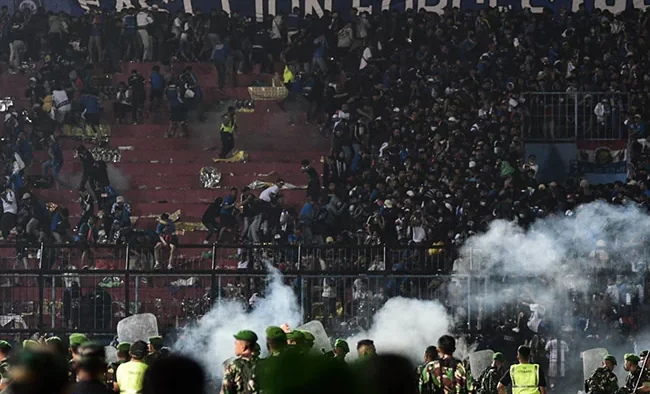Indonesia football match riot, stampede death toll reaches 174

There have been previous outbreaks of trouble at matches in Indonesia, with a strong rivalry between clubs sometimes leading to violence among supporters.
In an earlier statement on Sunday, Mr Nico had said two police officers were among the dead. Thirty-four people died inside the stadium and the rest died in hospital, the police chief had said.
Indonesian President Joko Widodo said authorities must thoroughly evaluate security at matches, adding that he hoped this would be “the last soccer tragedy in the nation.”
Mr Joko ordered the Football Association of Indonesia (PSSI) to suspend all games in the Indonesian top league BRI Liga 1 until an investigation had been completed.
“I regret this tragedy and I hope this is the last tragedy of football in the country,” said Mr Jokowi, as the president is known.
Indonesia’s chief security minister Mahfud MD said on Sunday that the number of spectators exceeded the capacity of the stadium. In an Instagram post, he said 42,000 tickets had been issued for a stadium that had a capacity to hold 38,000 people.
Police said about 3,000 from the crowd stormed the pitch. Video footage circulating on social media showed people shouting obscenities at police, who were holding riot shields.
World football’s governing body FIFA specifies in its safety regulations that no firearms or “crowd control gas” should be carried or used by stewards or police. East Java police did not immediately respond to a request for comment on whether they were aware of such regulations.
PSSI Secretary General Yunus Nusi said that FIFA had requested a report on the deadly incident and that a PSSI team had been sent to the site to investigate.
Indonesia’s human rights commission planned to investigate security at the ground, including the use of tear gas, its commissioner told Reuters.
Indonesia’s sports minister Zainudin Amali said the authorities would re-evaluate safety at football matches and consider not allowing spectators.
“We’re sorry for this incident… this is a regrettable incident that injures our football at a time when supporters can watch football matches from the stadium,” he told broadcaster Kompas.
“We will thoroughly evaluate the organisation of the match and the attendance of supporters. Will we return to banning supporters from attending the matches? That is what we will discuss.”
The match between Arema FC and Persebaya Surabaya took place at the Kanjuruhan Stadium. After Arema lost 3-2 on its home field, dozens of fans rushed to the field. The Times of Indonesia reported that security officers tried to keep the crowd at bay by hitting and kicking supporters.
As fights broke out, the authorities fired bursts of tear gas onto the field and into the stands. One video from the scene showed fans running away from clouds of tear gas on the field.
Local news outlets said thousands of fans struggled to breathe and several eventually fainted. Images showed people who appeared to have lost consciousness being carried away by other fans.
Torched vehicles, including a police truck, littered the streets outside the stadium on Sunday morning. Police said 13 vehicles in total were damaged.
The head of one of the hospitals in the area treating patients told Metro TV that some of the victims had sustained brain injuries and that the dead included a five-year-old child.
Financial aid would be given to the injured and the families of victims, East Java Governor Khofifah Indar Parawansa told reporters.
The Indonesian top league immediately suspended play for at least a week.
“We are concerned and deeply regret this incident,” said president director of PT Liga Indonesia Baru Akhmad Hadian Lukita. “We share our condolences, and hopefully this will be a valuable lesson for all of us.”
Football violence has long been a problem for Indonesia. Violent, often deadly rivalries between major teams are common. Some teams even have fan clubs with so-called commanders, who lead armies of supporters to matches across Indonesia.
Flares are often thrown on the field and riot police are a regular presence at many matches. Since the 1990s, dozens of fans have been killed in football-related violence.
Saturday’s stadium disaster appeared to be the deadliest since 328 people were reported dead in a riot and crush when Peru hosted Argentine at the Estadio Nacional in 1964.
Among other global stadium disasters, 96 Liverpool supporters were crushed to death in Britain in April 1989, when an overcrowded and fenced-in enclosure collapsed at the Hillsborough Stadium in Sheffield.
Indonesia is to host the Fifa under-20 World Cup in May and June next year. They are also one of three countries bidding to stage next year’s Asian Cup, the continent’s equivalent of the Euros, after China pulled out as hosts.
The head of the Asian Football Confederation, Shaikh Salman bin Ebrahim Al Khalifa said in a statement he was “deeply shocked and saddened to hear such tragic news coming out of football-loving Indonesia”, expressing condolences for the victims, their families and friends, reports AFP, BLOOMBERG.











